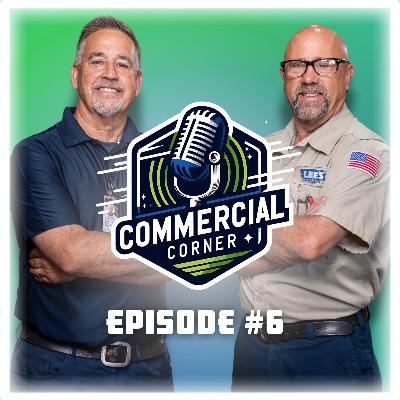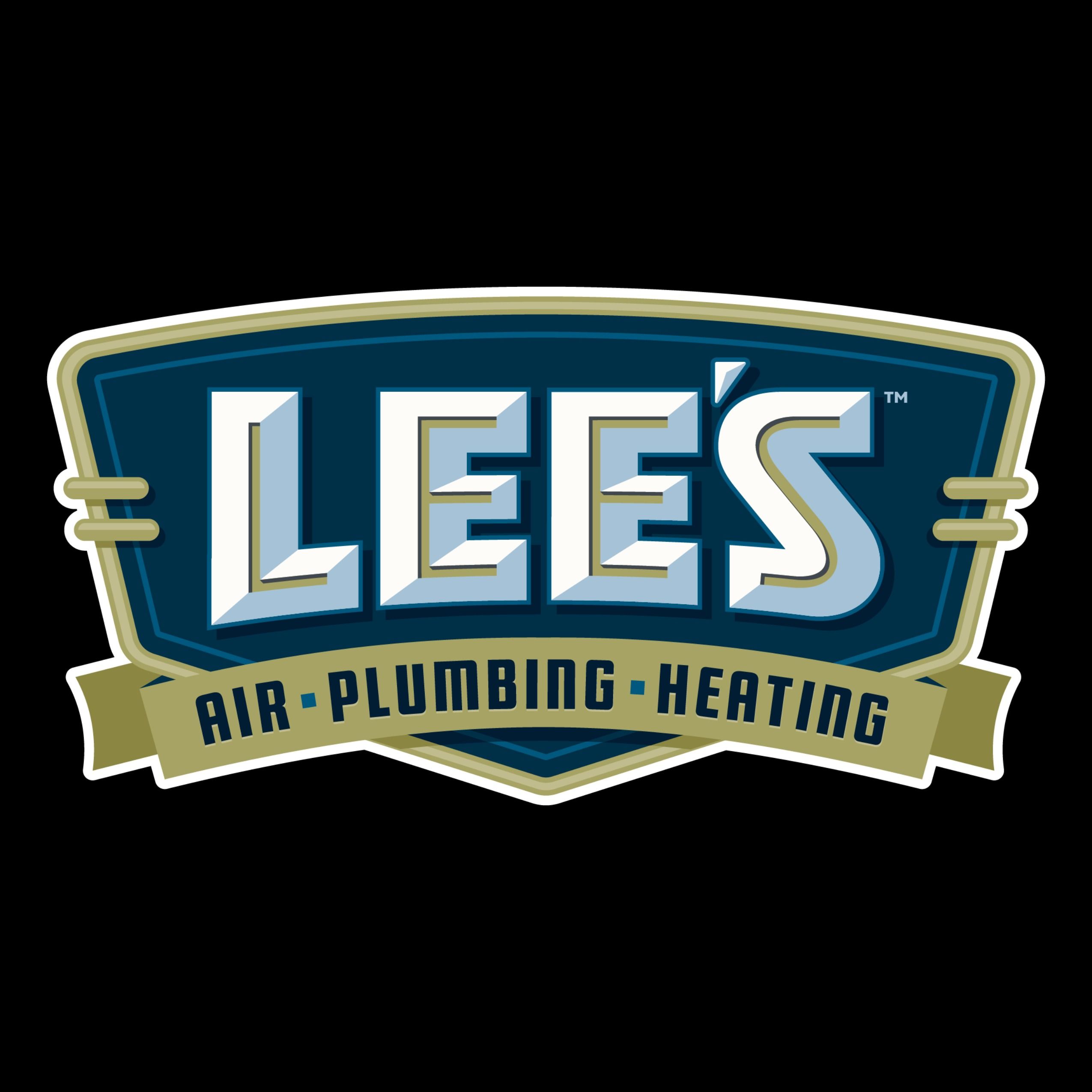Commercial Corner with Jeff & Allen Episode 1
Description
Morning, my name is Jeff and I'm in the commercial department here at Lee's and I have Alan, who's also our commercial service manager between the two of us, we kind of lead the commercial effort here at Lee's Air and we were talking the other day and thought we'd sit down and talk about it a little bit.
The fact that between the two of us. Well over 60 years experience and we've watched this thing here at Lee's Air go from, well, Alan, all commercial when we started, right? We had a very small company and, uh, it was mostly commercial based, small residential, and now it's, we're the small fish in the, in the pond, but we still do a lot of big things. Yeah. A lot of good work, helping a lot of companies, uh, keep their energy bills down and maintain, uh, quality, uh, Quality comfort and indoor air quality. Yeah, so when we first started, uh, when I first started, Alan was already here and We had a, we had a book of customers that we took care of regularly and ironically still have a lot of those customers today. And we have many of them just continue to take care of them. And we've built a relationship that's built on response and thoroughness and it's really helped to, in my opinion, has helped to set the standard of stability to help the other things that we do now, which we've gotten really big in the residential, uh, Um, So there's a lot of different options. Outside the plumbing and now roofing all but it all started with that. With the reputation that we have and our commercial department in my opinion. Yeah, yeah. The, uh, the, the Lee family, that's kind of where they were there. Where the focus was, and what they really enjoyed to do doing more than the residential. But, uh, yeah. things things evolve over the years speaking of like commercial maintenance and maintaining your buildings it's like you're either gonna pay A contractor to keep your equipment running well and efficient, or you're gonna pay pg e who, who would you rather pay? Right? And you're also gonna extend the life of the equipment in the process life of the equipment. The breakdowns are gonna be, uh, less frequent and more managed. You can, we can help you budget those breakdowns, uh, to where you're not, I mean, there's always the opportunity there. Always the possibility of something major failing. That's just. Equipment we deal with in the components. You know, uh, a lot of the equipment that we use. I mean, it gets in the commercial area. It's got a lot of run time on it. Heavy hours where it just goes hard. Um, because, you know, there are people down below the roof, server rooms, people, um, processing, there's a lot in commercial that people don't even realize, uh, Residential, you're like, oh, I'm hot. Let me turn it down. You don't have that ability. It, uh, residential, you're at a commercial. You're bringing in. Not only do you have to filter the air, but you're bringing in fresh air to maintain air quality. There's, there's a balance in adjusting air flows and keeping, you know, keeping a good, uh. Good, consistent temperature. Um, we have products that you can remotely. Look at your equipment and look at your energy usage and help you control your energy costs and comfort levels as well. So we have a lot of ability to do different things. So I actually have a couple of questions for you this morning if you feel comfortable with me. So as I was thinking about this little sit down we were going to have, I want to ask you this question. It's kind of broad, but, um, In all your years in the industry, um, what do you think has changed the most? And what do you think has changed the least? Uh, the thing that's changed the most is just the, uh, inverter technology, the high, the ultra high efficiency equipment, uh, standard equipment. When I first started was basically a hundred percent on a hundred percent off. Now you have inverters that can vary the load and match. You can have a unit that's sized for, uh, You know, 10 tons, but it'll ramp down as low as, you know, three tons. So it's going to match whatever you need versus just, you know, blasting on and blasting off and shutting off. Sure. Um, the things that have changed the least is just, uh, the constant is just trying to maintain people. You know, we're here to make people, you know, if I do my job, right, your employees are happy. Your customers are happy. And you know, If you have a retail store, they're going to stay longer. If they walk in and it's hot, they're probably not going to spend a lot of time shopping. And if your employees in an office are uncomfortable, well, that's all they're going to focus on is being uncomfortable. So you're going to lose productivity. But yeah, I mean, the people that we serve are always going to be the constant. Yeah, I see it this way. We're not in the air conditioning business here at Lee's. No. We're not in the plumbing business. We're not in the roofing business. We're in the people business. We just happen to be good at those things along the way. So, and that's my, that's what I feel every morning when I get up is a desire to take care of people and all the rest of it comes along. You know, I, when I first started, I remember there was a formula. I think you've heard it before, too, that, uh, you know, our goal was to. Um, do replacement air conditioning at about 1, 500 a ton back in the day. That was, that would get you where you needed to be to keep your business moving along and now. You know, now the cost of equipment is over 2, 000 a ton just to buy it. And, but the thing that hasn't changed as when all that has, after all those things have changes, people are the same. Yeah. Um, what isn't more expensive these days? Gosh, go buy, go buy a carton of eggs or a gallon of milk. You know, it's, yeah, it's very expensive, unfortunately. So question number two. Um, so we've always. process of bringing in new people because we've grown a lot over the last, you know, 25 years. And we get people from a couple of different areas. We have veterans that are transitioning. We have, um, we have technicians that we bring up from the residential side into the commercial side. Once they get some experience under their belt, but we also have a constant flow of new guys that come out of school that are applying and when you we see the application, sometimes 20 people a day want to try to get get their job here fresh out of school. What are your thoughts on a guy coming right out of school and being able to be on your team? That's a bit of a difficult transition just because the complexity of. What we do and how we do it. Um, it's not impossible, but it is more difficult. Uh, person would already have to have a bit of a construction and maybe a, um, you know, construction, electrical, especially mechanical. It's not just having the head knowledge. You've got to be able to take things apart, put things back together efficiently and effectively safely. Um, So it's tough. There's, it's not impossible, but it's, it's a definitely a little bit, a little bit harder now. I'm not saying that residential is easy, right? By any stretch of the imagination, our industry, it keeps getting more and more complicated as the equipment gets more and more, um, energy efficient, sophisticated, more and more sophisticated. It's just, uh, you know, Everything's computer driven now, so not only do you have to know the refrigeration side, but now, now we're almost quasi, uh, electronics, uh, experts and programming experts. I mean, we, uh, the one thing about this industry, when you, to come back to that question of what, what's, hasn't changed, and that's the, your, your level of knowledge has to constantly evolve. You have to constantly be up, looking. Fortunately, there's a lot of stuff on the internet. When I first started, there was no internet. You know, you pretty much see to the pants, figured it out. Um, but you have to be constantly learning. There's new stuff coming out and just, and even just understanding, getting a better understanding of what you already know. Sure. So, um, that's what makes it tough for a guy coming right out of school. Yeah. It's it's very over this this business can be very overwhelming to anybody just starting So I want to go let me switch gears a little bit So when you know when you're thinking about most people think about their own home their residence, you know They got they got a driveway. I get a single story house for the most part. Maybe too Sorry, they got a unit on the roof or you're on the ground and that's Usually the extent of what most people know and that's fine. But in the commercial world Tell me about some of the differences about logistics, figuring out which unit it is, how to get on the building, who's in charge, how the, how the business relationships work and how you, how you've been able to teach your team to be successful in, in, in this arena or this part of air conditioning, which is so much different. The residential market. Yeah, it's, it's interesting. Oftentimes you go into an office and they're like, well, we're not sure that this thermostat controls this area or not. You get a lot of that, um, sometimes figuring out which unit is connected to what thermostat, uh, sometimes that'll take a few minutes to, to deal with, um, and thermostats, four thermostats controlling one unit, figure that out. Right. You know, um, It can be, uh, it's like anything else. It's, it's your troubleshooting skills. You have to go through and figure out, take the steps and the time to, to understand what, what we're working on before you really can even figure out what's wrong sometimes. That's a long question. What I've noticed is, you know, we go to a lot of our customers and new customers as well. We show up and the unit has always been in the same place on the roof since the building was built. Yet they may have changed the layout of the space below through tenant improvements, et cetera, multiple times.







